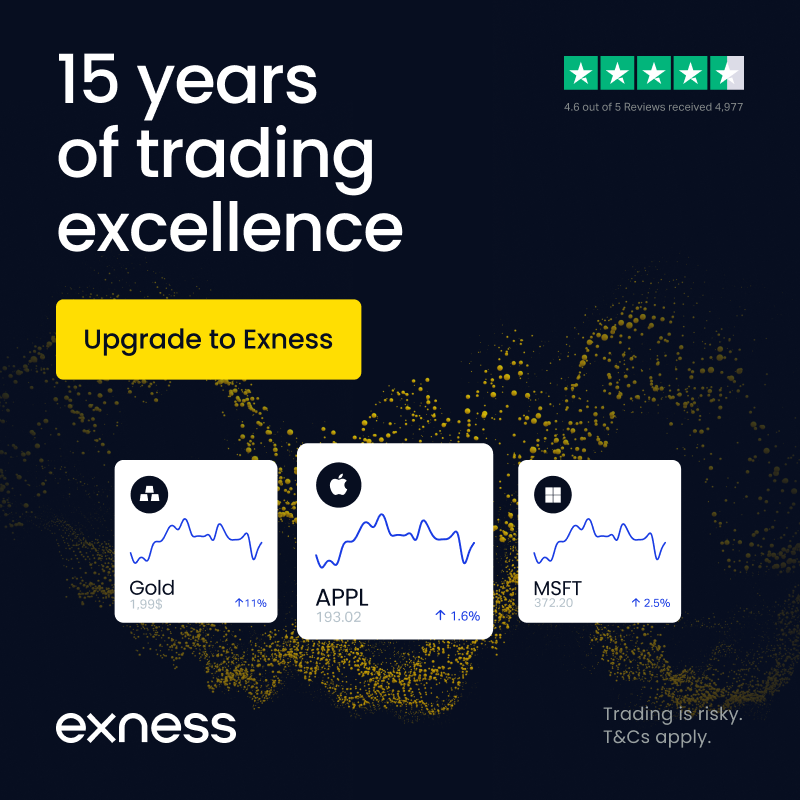
9 minute read
Is Exness banned in India 2025
Is Exness banned in india 2025: The topic of whether Exness, a prominent global forex and CFD broker, is banned in India is a complex and evolving issue that has garnered significant attention in recent years. As the regulatory landscape in India continues to undergo changes, it is essential to explore the current status and potential future implications for Indian traders who wish to engage with Exness.
Understanding the Regulatory Status of Exness in India
The Indian Forex Trading Landscape
India has a regulated financial market, and the forex trading industry is subject to oversight by various regulatory bodies, including the Reserve Bank of India (RBI) and the Securities and Exchange Board of India (SEBI). These regulatory authorities are responsible for establishing guidelines and policies that govern the operations of forex brokers and their interactions with Indian traders.
📌📌📌 Open Exness An Account ✅
💥💥💥Visit Website Exness Official ✅

Exness and Its Presence in India
Exness, a globally renowned forex and CFD broker, has had a presence in the Indian market for several years. The company has been actively engaged with Indian traders, offering a range of trading platforms, educational resources, and customer support services. However, the regulatory status of Exness in India has been a subject of ongoing discussion and scrutiny.
Regulatory Oversight and Restrictions
The Indian regulatory authorities have implemented various measures to monitor and control the activities of foreign forex brokers operating in the country. These measures include restrictions on the types of financial instruments that can be traded, as well as requirements for brokers to obtain specific licenses and registrations to offer their services to Indian clients.
Is Exness Banned in India
The question of whether Exness is banned in India is a complex one, as the regulatory landscape is constantly evolving and can vary based on specific circumstances.
As of now, Exness is not officially licensed to operate in India. While it's still accessible to Indian traders through its global platform, it's important to be aware of the regulatory landscape in India regarding forex trading.
The Reserve Bank of India (RBI) has specific guidelines for forex trading in India. 1 It's crucial to understand these regulations and ensure that any forex activities you engage in are compliant.
Exness' Current Operating Status in India
Exness currently maintains an active presence in the Indian market, with a dedicated website and support services catering to Indian traders. The company has made efforts to comply with the regulatory requirements set forth by the Indian authorities, including obtaining the necessary licenses and registrations.
📌📌📌 Open Exness An Account ✅
Regulatory Ambiguity and Uncertainties
However, the regulatory status of Exness in India is not entirely clear-cut. There have been instances where the company's operations have faced scrutiny or encountered challenges due to the evolving regulatory landscape. This has led to a certain degree of ambiguity and uncertainty among Indian traders regarding the legality of trading with Exness.
Potential Bans and Restrictions
While Exness has not been outright banned in India, there have been instances where the company's activities have been restricted or subjected to additional oversight by the regulatory authorities. This is primarily due to the ongoing efforts by the Indian government to tighten control over the forex trading industry and protect domestic investors.

Exness and Indian Traders: Current Restrictions Explained
The relationship between Exness and Indian traders is shaped by the regulatory environment and the restrictions imposed by the Indian authorities.
Regulatory Requirements and Compliance
Indian traders who wish to engage with Exness must adhere to the regulatory requirements set forth by the RBI and SEBI. This includes obtaining the necessary licenses, adhering to foreign exchange management regulations, and complying with anti-money laundering (AML) and know-your-customer (KYC) guidelines.
Restrictions on Financial Instruments
The Indian regulatory authorities have placed limitations on the types of financial instruments that can be traded by Indian investors. For instance, certain derivative products, such as certain CFDs, may be prohibited or subject to stricter regulations. This can impact the range of trading options available to Indian traders who choose to work with Exness.
Geographical Restrictions and Access Limitations
In some cases, Indian traders may face geographical restrictions or access limitations when it comes to utilizing Exness' services. This can be due to the company's efforts to comply with the regulatory requirements or the specific directives issued by the Indian authorities.
Compliance Challenges and Ongoing Monitoring
Exness and Indian traders must navigate the complex regulatory landscape and ensure compliance with the ever-evolving rules and regulations. This can lead to challenges and ongoing monitoring by the regulatory authorities, which can impact the seamless operation of the broker-trader relationship.
Legal Implications of Trading with Exness in India
The legal implications of trading with Exness in India are crucial for Indian traders to understand, as they can have significant consequences.
Regulatory Compliance and Legal Risks
Indian traders who engage with Exness must ensure that they are in full compliance with the applicable laws and regulations. Failure to do so can result in legal consequences, such as fines, penalties, or even criminal charges.
Jurisdiction and Legal Recourse
The legal jurisdiction and the availability of legal recourse for Indian traders who encounter issues with Exness can be complex. Traders may face challenges in seeking legal redress, as the regulatory framework and the legal systems involved can be multifaceted.
Investor Protection and Dispute Resolution
The level of investor protection and dispute resolution mechanisms available to Indian traders who use Exness' services can vary based on the regulatory framework and the specific agreements between the trader and the broker. Traders should carefully review and understand these aspects before engaging with Exness.
Taxation and Financial Reporting Obligations
Indian traders who trade with Exness may have specific tax and financial reporting obligations that they must fulfill. Failure to comply with these requirements can result in legal and financial consequences.
Exness: Is It Legal or Banned for Indian Investors?
The legality of Exness for Indian investors is a complex issue that requires a nuanced understanding of the regulatory landscape and the specific circumstances surrounding the broker's operations in the country.
Legality and Regulatory Compliance
Exness' legal status in India is not entirely clear-cut. While the company maintains an active presence and serves Indian traders, it must navigate the evolving regulatory requirements set forth by the Indian authorities. Compliance with these regulations is crucial for Exness to continue operating legally in the country.
Instances of Regulatory Scrutiny
There have been instances where Exness' activities have faced regulatory scrutiny or encountered challenges due to the changing regulatory environment in India. This has led to a degree of uncertainty and ambiguity regarding the legality of the broker's operations in the country.
Potential Bans and Restrictions
Despite the company's efforts to comply with the regulatory requirements, the possibility of Exness being banned or facing significant restrictions in India cannot be ruled out. The Indian authorities have demonstrated a willingness to take strict measures to control the forex trading industry and protect domestic investors.
Importance of Staying Informed
Indian traders who wish to engage with Exness must stay informed about the latest developments in the regulatory landscape and be vigilant about the company's operational status in the country. It is crucial to carefully assess the risks and seek professional guidance before making any trading decisions.

Impact of Exness Ban on Forex Trading in India
The potential ban or significant restrictions on Exness' operations in India can have far-reaching implications for the forex trading industry in the country.
Reduced Competition and Choices for Traders
If Exness is banned or faces severe restrictions in India, it could reduce the overall competition and choices available to Indian traders in the forex market. This could lead to a narrower selection of brokers and trading platforms, potentially impacting the quality of services and trading conditions.
Potential Disruption to Existing Trader Accounts
A ban or significant restrictions on Exness could disrupt the trading activities of Indian traders who have existing accounts with the broker. This could lead to uncertainty, account closures, and challenges in transferring funds or positions to alternative platforms.
Potential Shift Towards Unregulated Brokers
In the event of a ban or severe restrictions on Exness, some Indian traders may be tempted to turn to unregulated or offshore brokers, which could expose them to additional risks and legal complications.
Impact on the Overall Forex Trading Ecosystem
The potential ban or restrictions on Exness could have a ripple effect on the broader forex trading ecosystem in India. It could influence the strategies and business decisions of other brokers, as well as the regulatory approach taken by the Indian authorities.
Future of Exness Trading in India: Prospects and Challenges
The future of Exness' trading operations in India is subject to various factors and uncertainties, which will shape the prospects and challenges for the broker and Indian traders alike.
Evolving Regulatory Landscape
The Indian regulatory landscape is constantly evolving, and the authorities are likely to continue their efforts to tighten control over the forex trading industry. Exness will need to closely monitor these changes and adapt its operations accordingly to maintain its presence in the Indian market.
Compliance and Regulatory Adaptability
Exness' ability to navigate the regulatory requirements and demonstrate its compliance will be crucial in determining its long-term prospects in India. The broker's willingness and capacity to adapt to the changing regulations will be a key factor.
Engagement with Regulatory Authorities
The relationship and ongoing engagement between Exness and the Indian regulatory authorities will play a significant role in the broker's future. Constructive dialogue and collaboration can help address concerns and explore solutions that benefit both the broker and the Indian traders.
Diversification of Product Offerings
Exness may need to diversify its product offerings and services to align with the regulatory requirements and market demands in India. This could involve exploring alternative financial instruments or adapting its trading platforms to suit the specific needs of Indian traders.
Conclusion
The question of whether Exness is banned in India is a complex and evolving issue that requires a nuanced understanding of the regulatory landscape and the specific circumstances surrounding the broker's operations in the country. While Exness currently maintains an active presence in the Indian market, the regulatory status and the potential for future bans or restrictions remain a source of uncertainty for Indian traders.
✳️ Read more:










